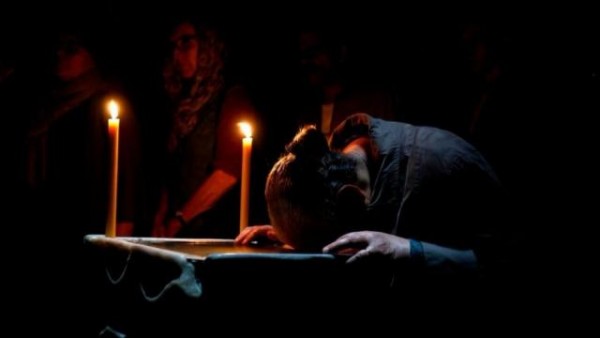
© Getty Images
ishtartv.com - thehill.com
By
Cécilia Attias, 05/14/2018
June
6th will mark the one year anniversary of the U.S. House of Representatives
unanimously passing The Iraq and Syria Genocide Emergency Relief and
Accountability Act, which would provide U.S. funding directly to Christians in
Syria and Iraq impacted by the genocide committed by the Islamic State (ISIS).
It would also ensure that evidence is collected for prosecuting the
perpetrators of these crimes against humanity.
The
bill, however, has languished in the U.S. Senate for almost nine months, and
there are no signs that it will be voted on anytime in the near future.
The
refusal of the United States Congress to act is just the latest example of
leaders and citizens from around the world silently standing by as nothing is
done to stop the elimination of Christians from the Middle Eastern lands they
have called home since the time of the New Testament. Even the Trump
administration, which had promised to make the plight of Middle East Christians
a priority, has largely been missing in action since Vice President Mike Pence's much-anticipated
visit to the Middle East in January delivered few results or signs of hope.
With
the United States and the West now doing virtually nothing to prevent the
extinction of Middle East Christians, the situation may appear to be grim.
There are, however, small flickers of hope that we must use to reignite a
global effort aimed at protecting this vulnerable population.
After
a wave of bombings and horrific attacks carried out in 2016 and 2017 by ISIS
against Egypt’s Christian Copts, the largest Christian group in the Middle
East, violence has decreased in recent months. The government has stepped up
prosecution of terrorists while implementing new security measures, including
setting up checkpoints and metal detectors near places of worship.
In
Saudi Arabia, which has long banned the practice of any faiths outside of
Islam, the reformist Crown Prince Mohammed bin Salman has opened an interfaith
dialogue, hosting historic visits by Christian leaders, including
Pope Tawadros II, head of Egypt's Coptic Orthodox Church, and French Cardinal
Jean-Louis Tauran, the most senior Vatican official to ever visit the Kingdom.
In
Iraq, where the Christian population was once as high as 1.5 million but has been
reduced by ISIS to fewer than 200,000, some refugees are beginning to return to
their devastated cities and towns. The numbers, however, are sobering. Almost
30,000 Christians lived in Mosul, Iraq before ISIS took over the city in 2014;
fewer than one hundred have gone back as of April 2018.
If
we choose not to foster these signs of hope and progress, Middle Eastern
Christians will join the ranks of Rwanda, Bosnia, Darfur, Armenia, the
Holocaust, and other preventable tragedies that unfolded as the world was
watching. The Spanish-American philosopher George Santayana’s oft-cited warning
that those who fail to learn from history are condemned to repeat it is
especially relevant in light of a recent survey which found that over a fifth of young Americans
have not heard of or are unsure if they have heard of the Holocaust.
We
would all do well to heed the work and words of Payam Akhavan, whose family
fled Iran in the 1970s because of the persecution of his Bahá’í faith. His 2017
memoir, "In Search of a Better World", chronicled his rise to
becoming a renowned human rights lawyer and UN prosecutor who helped set up the
international tribune that brought criminals to justice after the Rwandan
genocide. He told the CBC last fall that Rwanda “was a Holocaust in the
making, but not one concealed behind the walls of concentration camps. It was
unfolding in plain sight, and the world watched on television, and did nothing."
On
July 7th, Pope Francis will gather heads of churches and Christian communities
from the Middle East to join him in Bari, Italy for a day of reflection and
prayer with the goal of raising awareness of their plight. Let us resolve to
make July 7th also a day of gratitude, where those religious leaders can also
deliver prayers of thanks in acknowledgement of the world finally taking action
to ensure that future generations of Christians survive and thrive in the
Middle East.
|